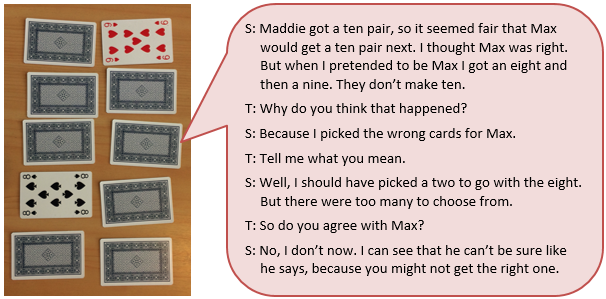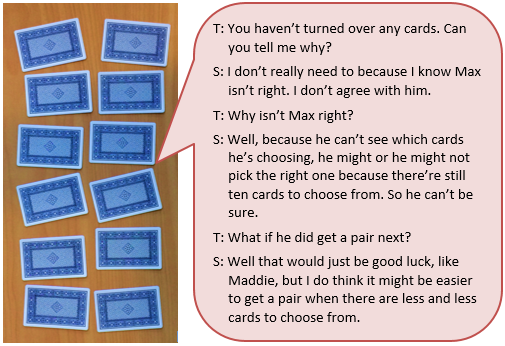Will he? Won't he?
The purpose of this activity is to engage students in considering another’s statement about the probability of an outcome in a game of chance.
This activity assumes the students have experience in the following areas:
- Using everyday language to describe the chance of an event occurring.
- Ordering events by likelihood.
- Exploring simple probabilistic situations in which all the outcomes can be listed.
The problem is sufficiently open ended to allow the students freedom of choice in their approach. It may be scaffolded with guidance that leads to a solution, and/or the students might be given the opportunity to solve the problem independently.
The example responses at the end of the resource give an indication of the kind of response to expect from students who approach the problem in particular ways.
Maddie and Max are playing Memory Tens. Here are their cards. 
They’ve turned them over like this and mixed them up. 
They are taking turns to turn over two cards. If the pair adds to ten, the person keeps them. Maddie goes first. She turns these cards over. 
Max says, “ Now I’m sure to get a pair that makes ten next.”
Do you agree with Max? Say why or why not.
Note to teacher: This activity requires materials for illustration. Make playing cards available.
The following prompts illustrate how this activity can be structured around the Statistical Enquiry Cycle.
Problem
The problem section is about what data to collect and who to collect it from and why it’s important.
- What is my investigation question? (Will Max get a pair of numbers that add to ten?)
- What information have I got? Do I need any more information?
- Am I clear how a game of Memory is played?
- What will an answer to the question be like? (A position needs to be taken on whether, or not, Max is correct. The position must be explained or justified.)
Plan
The planning section is about how students will gather the data.
- How will I go about answering this question?
- Could I act out the game with another person?
- Could I think about the game to answer the question?
- What would I need to think about?
Data
The data section is concerned with how the data is managed and organised.
- What things do I need to try out Maddie and max’s game?
- How many games should I try?
- How will I record what happens?
- Do I expect the same thing to happen each time, or will each game be different? Why?
Analysis
The analysis section is about exploring the data and reasoning with it.
- Have I looked at the results of the games?
- Do the results help me to answer the question?
- What can I say about Max’s idea, using my data?
- Does what happened match what I thought at first?
- How are the results the same or different to what I first thought?
Conclusion
The conclusion section is about answering the question in the problem section and providing reasons based on their analysis.
- Have I answered my question? If not, why not?
- What is my answer?
- How do I use my results to convince someone else I am right?
- Do my thinking and result match? If they do not match, can I rethink about the game?
- What maths or statistics do I need to learn to make more sense of games like this?
Examples of work
Work sample 1
The student initially thinks that Maddie getting a pair means that Max will also do the same. After trialing Max’s turn with cards they realise that Max is not guaranteed to get a pair of numbers that add to ten.
Click on the image to enlarge it. Click again to close.
Work sample 2
The student realises that the chance of Max getting a pair of numbers that add to ten is uncertain because the choice of cards is not controlled.

